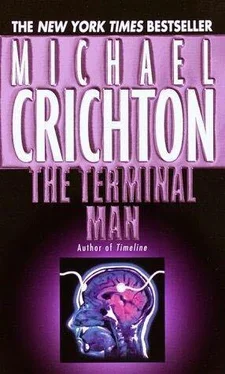Michael Crichton - The Terminal Man
Здесь есть возможность читать онлайн «Michael Crichton - The Terminal Man» весь текст электронной книги совершенно бесплатно (целиком полную версию без сокращений). В некоторых случаях можно слушать аудио, скачать через торрент в формате fb2 и присутствует краткое содержание. Жанр: Фантастика и фэнтези, на английском языке. Описание произведения, (предисловие) а так же отзывы посетителей доступны на портале библиотеки ЛибКат.
- Название:The Terminal Man
- Автор:
- Жанр:
- Год:неизвестен
- ISBN:нет данных
- Рейтинг книги:3 / 5. Голосов: 1
-
Избранное:Добавить в избранное
- Отзывы:
-
Ваша оценка:
- 60
- 1
- 2
- 3
- 4
- 5
The Terminal Man: краткое содержание, описание и аннотация
Предлагаем к чтению аннотацию, описание, краткое содержание или предисловие (зависит от того, что написал сам автор книги «The Terminal Man»). Если вы не нашли необходимую информацию о книге — напишите в комментариях, мы постараемся отыскать её.
The Terminal Man — читать онлайн бесплатно полную книгу (весь текст) целиком
Ниже представлен текст книги, разбитый по страницам. Система сохранения места последней прочитанной страницы, позволяет с удобством читать онлайн бесплатно книгу «The Terminal Man», без необходимости каждый раз заново искать на чём Вы остановились. Поставьте закладку, и сможете в любой момент перейти на страницу, на которой закончили чтение.
Интервал:
Закладка:
The kitchens were shut down, too, but the lights were on, burning in a vast expanse of white-tiled rooms, with stainless-steel steam tables in long rows. "This is a short cut," she said as they went through the kitchen. Their footsteps echoed on the tiles. Anders walked loosely, holding his gun slightly ahead, barrel pointed out to the side.
They passed through the kitchen and back into another hallway. It was almost identical to the one they had left. Anders glanced at her questioningly. She knew he was lost; she remembered the months it had taken her to learn her way through the basement. "Turn right," she said.
They passed a sign on the wall: EMPLOYEES REPORT ALL ACCIDENTS TO YOUR SUPERVISOR. It showed a man with a small cut on his finger. Further down was another sign: NEED A LOAN? SEE YOUR CREDIT UNION.
They turned right down another corridor, and approached a small section containing vending machines - hot coffee, doughnuts, sandwiches, candy bars. She remembered all the late nights when she had been a resident in the hospital and had come down to the vending machines for a snack. The old days, when being a doctor seemed like a good and hopeful thing to be. Great advances would be made during her lifetime; it would be exciting; she would be a part of it.
Anders peered into the vending area, then paused. He whispered: "Have a look at this."
She looked, astonished. Every machine had been smashed. There were candy bars and sandwiches wrapped in plastic strewn across the floor. Coffee was pouring in short, arterial spurts from the coffee vender onto the floor.
Anders stepped around the puddles of coffee and soda and touched the dents and tears in the metal of the machines.
"Looks like an axe," he said. "Where would he get an axe?"
"Fire-extinguisher stations have them."
"I don't see the axe here," he said, looking around the room. Then he glanced at her.
She didn't reply. They left the vending area and continued down the corridor. They came to a turn in the tunnels.
"Which way now?"
"Left," she said. And she added: "We're very close."
Ahead of them, the hall took another turn. Ross knew that hospital records was around the turn, and just beyond that, the computer. The planners had located the computer near the records room because they eventually hoped to computerize all the hospital records.
Suddenly Anders froze. She stopped and listened with him. They heard footsteps, and humming - somebody humming a tune.
Anders put his finger to his lips, and gestured to Ross to stay where she was. He moved forward, toward the turn in the corridor. The humming was louder. He paused at the turn and looked cautiously around the corner. Ross held her breath.
"Hey!" a male voice shouted, and suddenly Anders's arm flicked around the corner like a snake, and a man sprawled across the floor, skidding down the hall toward Ross. "Hey!" A bucket of water sloshed across the floor. Ross saw that it was an elderly maintenance man. She went over to him.
"What the- "
"Sh-h-h," she said, a finger to her lips. She helped the man back to his feet.
Anders came back. "Don't leave the basement," he said to the man. "Go to the kitchen and wait. Don't try to leave." His voice was an angry hiss.
Ross knew what he was saying. Anyone who tried to leave the basement now was likely to be shot by the waiting cops.
The man was nodding, frightened and confused.
"It's all right," Ross said to him.
"I didn't do nothin'."
"There's a man down here we have to find," Ross said.
"Just wait until it's over."
"Stay in the kitchen," Anders said.
The man nodded, brushed himself off, and walked away. He looked back once, shaking his head. She and Anders continued along the corridor, turned a corner, and came to the records section. A large sign sticking out from the wall said: PATIENT RECORDS.
Anders looked at her questioningly. She nodded. They went inside.
Records was a giant space, filled with floor-toceiling shelves of patient records. It was like an enormous library. Anders paused in surprise.
"Lot of bookkeeping," she said.
"Is this every patient the hospital ever had?"
"No," she said. "Every patient seen in the last five years. The others are stored in a warehouse."
"Christ."
They moved down the parallel stacks of shelves quietly, Anders leading with his gun. Occasionally he would pause to look through a gap in the shelves to another corridor. They saw no one at all.
"Anybody on duty here?"
"Should be."
She scanned the rows of charts. The record room always impressed her. As a practicing doctor she had an image of medical practice that involved large numbers of patients. She had treated hundreds, seen thousands for a single hour or a few weeks. Yet the hospital records ran into the millions - and that was just one hospital, in one city, in one country. Millions and millions of patients.
"We have a thing like this, too," Anders said. "You lose records often?"
"All the time."
He sighed. "So do we."
At that moment, a young girl no more than fifteen or sixteen came around the corner. She carried a stack of records in her arms. Anders had his gun up in an instant. The girl looked, dropped the records, and started to scream.
"Quiet," Anders hissed.
The scream was cut off abruptly, to a kind of gurgle. The girl's eyes were wide.
"I'm a policeman," Anders said. He flicked out his shoulder wallet to show the badge. "Have you seen anyone here?"
"Anyone…"
"This man."' He showed her the picture.
She looked at it, and shook her head.
"You're sure?"
"Yes… I mean, no… I mean…"
Ross said, "I think we should go on to the computer." In some way, she was embarrassed at frightening the girl. The hospital hired high school and college students part-time to do the clerical work in records; they weren't paid much.
Ross herself remembered when she had been frightened at about the same age. She had been walking in the woods with a boy. They had seen a snake. The boy told her it was a rattlesnake, and she was terrified. Much later she learned he had been teasing her. The snake was harmless. She had resented-
"All right," Anders said. "The computer. Which way?"
Ross led the way out. Anders turned back once to the girl, who was picking up the charts she had dropped. "Listen," he said. "If you do see this man, don't talk to him. Don't do anything except shout your bloody head off. You understand?"
She nodded.
And then Ross realized that the rattlesnake was real, this time. It was all real.
They came out into the corridor again, and continued down it toward the computer section. The computer section was the only refinished part of the basement. The bare concrete floor changed abruptly to blue carpeting; one corridor wall had been knocked out to install large glass windows that looked in, from the corridor, to the room that housed the main banks of the computer. Ross remembered when the computer was being installed; it seemed to her that the windows were an unnecessary expense, and she had mentioned it to McPherson.
"Better let the people see what's coming," McPherson had replied.
"What does that mean?"
"It means that the computer is just a machine. Bigger and more expensive than most, but still just a machine. We want people to get used to it. We don't want them to fear or worship it. We want them to see it as part of the environment."
Yet every time she passed the computer section, she had the opposite feelings: the special treatment, the hallway carpeting, and the expensive surroundings served to make the computer special, unusual, unique. She thought it significant that the only other place in the hospital where the floor was carpeted was outside the small nondenominational chapel on the first floor. She had the same sense here: a shrine to the computer.
Читать дальшеИнтервал:
Закладка:
Похожие книги на «The Terminal Man»
Представляем Вашему вниманию похожие книги на «The Terminal Man» списком для выбора. Мы отобрали схожую по названию и смыслу литературу в надежде предоставить читателям больше вариантов отыскать новые, интересные, ещё непрочитанные произведения.
Обсуждение, отзывы о книге «The Terminal Man» и просто собственные мнения читателей. Оставьте ваши комментарии, напишите, что Вы думаете о произведении, его смысле или главных героях. Укажите что конкретно понравилось, а что нет, и почему Вы так считаете.









